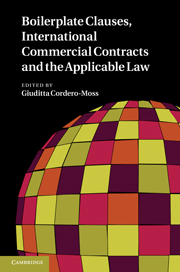Book contents
- Frontmatter
- Contents
- List of contributors
- Preface
- Introduction
- PART 1 How contracts are written in practice
- PART 2 Methodological challenges
- PART 3 The applicable law's effects on boilerplate clauses
- Conclusion: the self-sufficient contract, uniformly interpreted on the basis of its own terms: an illusion, but not fully useless
- Bibliography
- Index
Conclusion: the self-sufficient contract, uniformly interpreted on the basis of its own terms: an illusion, but not fully useless
Published online by Cambridge University Press: 11 April 2011
- Frontmatter
- Contents
- List of contributors
- Preface
- Introduction
- PART 1 How contracts are written in practice
- PART 2 Methodological challenges
- PART 3 The applicable law's effects on boilerplate clauses
- Conclusion: the self-sufficient contract, uniformly interpreted on the basis of its own terms: an illusion, but not fully useless
- Bibliography
- Index
Summary
The analysis carried out in this book shows that there is a gap between the way in which international contracts are written on the one hand and the way in which they are interpreted and enforced on the other. Contracts are often written as if the only basis for their enforcement were their terms and as if contract terms were capable of being interpreted solely on the basis of their own language. However, as Part 3 of this book showed, the enforcement of contract terms, as well as their interpretation, is the result of the interaction between the contract and the governing law. Considering contracts to be self-sufficient and not influenced by any national law, as if they enjoyed a uniform interpretation thanks to their own language and some international principles, thus proves to be illusionary. This contract practice may lead to undesired legal effects and is not optimal when examined from a legal point of view. Seen from a wider perspective, however, it may turn out to be more advantageous than employing large resources in order to ensure legal certainty.
International commerce fosters self-sufficient contracts
The gap between the parties' reliance on the self-sufficiency of the contract and the actual legal effects of the contract under the governing law does not necessarily derive from the parties' lack of awareness of the legal framework surrounding the contract.
- Type
- Chapter
- Information
- Publisher: Cambridge University PressPrint publication year: 2011



